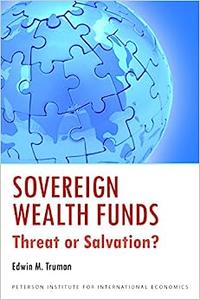
Free Download Edwin Truman, "Sovereign Wealth Funds: Threats or Salvation?"
English | 2010 | pages: 218 | ISBN: 0881324981 | PDF | 4,5 mb
This study examines the role of sovereign wealth funds (SWFs) in the global economy and financial system. Sovereign wealth funds are not a new phenomenon in international finance. Governments of a few countries have used similar entities to manage their international financial assets for several decades. Moreover, countries have always held international reserves, and government-owned entities have made cross-border investments for many years.
Sovereign wealth funds or their equivalent pose profound issues for the countries that own them with respect to macroeconomic policy and the potential for corruption. They also raise issues for countries that receive SWF investments as well as for the international financial system as a whole because government ownership introduces potential political and economic power issues into the management of these cross-border assets. This study traces the origins of SWFs. It describes the issues raised by these large governmental holdings of cross-border assets for the countries that own them, for the host countries, and for the international financial system. The study lays out what is known about the 50-plus SWFs of various countries. Some countries have more than one such entity, and a sample of government-managed pension funds is included in this analysis because they raise most of the same basic policy issues.
Using publicly available information that is provided on a systematic basis, the author has previously developed a "scoreboard" for these funds involving a number of elements grouped in four categories: structure, governance, transparency and accountability, and behavioral rules. The 2008 edition contributed to the development of a set of generally accepted principles and practices, the Santiago Principles, for SWFs by the International Working Group operating under the auspices of the International Monetary Fund. This publication presents an updated scoreboard for an expanded list of funds, evaluates the Santiago Principles, and examines current compliance with those principles. The study also examines the policies of recipient countries and the role of the Organization for Economic Cooperation and Development (OECD) investment codes. Finally, the study discusses the evolving role of SWFs in the context of the global economic and financial crisis and its aftermath and will make recommendations for the policies of countries both managing such funds and those that expect to receive investments from them in the future.










Leave a Reply
You must be logged in to post a comment.